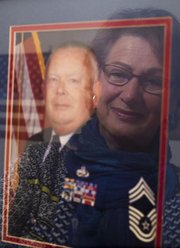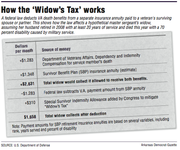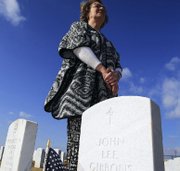FORT SMITH -- Near Amsterdam, Netherlands, on July 4, 1972, an American neighbor introduced 20-year-old Elly Boelhouwer to a U.S. Air Force staff sergeant.
John Gibbons was 25, a Vietnam veteran and the owner of a red Jaguar.
The Dutch woman and the American airman married a few months later.
Over the next 45 years, they begat two children, a lifelong marriage and 40 years of military service, most of it in Fort Smith.
Then early last year, John's military service took his life. He died of cancer caused by exposure to Agent Orange in Vietnam. And Elly was further shaken by a federal law that reduces survivors' payments for military widowers and widows like herself.
Dubbed the "Widow's Tax," the law isn't a tax at all.
It's a two-sentence provision, 10 U.S. Code 1451 (c)(2), that bars certain widows and widowers from collecting all of the paid-for annuities they and their spouses had counted on.
The law applies only to widows and widowers of military servicemen and servicewomen who died in action or, like John Gibbons, died in retirement from service-caused illnesses.
In addition to their paid annuities, these surviving spouses qualify for a death compensation benefit from the Department of Veterans Affairs.
And the federal "Widow's Tax" law -- officially titled the "DIC Offset" -- won't let widows and widowers collect both in full.
With the law in place, 64,600 military widows and widowers see their potential annuity incomes reduced by about $7,300 on average per year, according to the Department of Defense.
Many lose $10,000 and more.
WIDOW'S TAX
◦ Main menu
◦ Law adds insult to injury, military widows say
◦ Congress seen as sympathetic to repeal
◦ Five women describe how law affected them
Without the federal law, these surviving spouses would get both payments in full -- their annuity and VA compensation -- as many other federal government employees' survivors do.
Spouses of lower-rank and long-retired service members, in particular, say the reduction in expected income leaves them struggling to survive.
Nearly all who are affected -- 99 percent -- are women, according to Defense Department data.
More than 85 percent are age 62 and older.
Widows and veterans have tried for at least 20 years to repeal the statute. Members of Congress have expressed sympathy and even passed legislation to mitigate it.
Still, the "Widow's Tax" persists.
The American Legion has argued it's "an injustice to surviving spouses of America's heroes."
"I was outraged," Elly Gibbons said, when she learned that a federal law cuts her insurance annuity because her husband died as a result of serving his country, and his death qualified her for an additional federal benefit.
Though she flies a 5-foot American flag over her home every day, Gibbons finds it "insulting on the part of the government to treat us like this."
'FINANCIALLY DEVASTATING'
This is how the federal law cut into another widow's annuity.
Cathy Sanchez, 61, of Albuquerque, N.M., describes her experience as "financially devastating."
"House payments, car payments, bills were a challenge. I was grateful that my children were grown and self-supporting, otherwise it would have been an impossible situation," she wrote in an email.
She learned about the law that reduced her annuity payments about four months after her 68-year-old husband, retired Air Force Master Sgt. Abondio Albert Sanchez, died in November 2007.
He paid 6.5 percent of his retirement pay for 18 years under the military's popular Survivor Benefit Plan so that after his death, she could receive 55 percent of his retirement pay, she wrote.
The U.S. Department of Defense offers the Survivor Benefit Plan (SBP) annuity program.
Military retirees generally choose to pay in the 6.5 percent of retirement compensation with the understanding that if they die first and their retirement money stops, their survivors will receive 55 percent of their retirement pay for the rest of their lives. Cause of death usually isn't a factor.
Survivors of active-duty military members also can qualify for Survivor Benefit Plan annuities, but only if their servicemen or servicewomen die in the line of duty.
Cathy Sanchez also qualified for the VA's death compensation. Her husband died in retirement of pancreatitis as a result of Agent Orange exposure in Vietnam.
Called Dependency and Indemnity Compensation (DIC), the amount is currently $15,397 per year.
The 1972 federal "Widow's Tax," or DIC Offset, law sets out exactly how widows like Sanchez will get their annuities trimmed.
The Survivor Benefit Plan annuity "paid to a surviving spouse shall be reduced by the amount" of the VA's "dependency and indemnity compensation," the law says.
In Sanchez's case, she lost her entire Survivor Benefit Plan annuity payment, she said.
More than three of five affected widows and widowers lose every dollar of their expected survivor annuities, according to Defense Department data. The rest lose a significant portion of them.
Another federal provision steps in to ensure that they aren't left entirely empty-handed.
Authorized by Congress and made permanent last year, a Special Survivor Indemnity Allowance to mitigate the "Widow's Tax" gives back as much as $3,700 a year to widows and widowers like Sanchez.
Surviving spouses and veterans groups argue that the Defense Department's annuity plan and the Veterans Affairs death compensation were created for different reasons, and should be paid in full to those who qualify.
For Sanchez, the reduced annuity after her husband's death is "wrong on so many levels. You can't grieve because you are forced to just survive, somehow."
'AMERICA IS GRATEFUL'
As for the Gibbonses, John signed up for the Survivor Benefit Plan annuity for Elly when he retired in 2003.
That was eight years before he was diagnosed with aggressive prostate cancer that VA doctors linked to Agent Orange.
He never forgot the clouds of orange spray that rained over munitions storage facilities where he served during that war.
In the last five painful years of his illness, Elly was his caregiver.
"America is grateful to you for your sacrifice," a recent VA letter to her noted.
She has written, called or visited offices from Congress to the White House.
"This is an injustice!" she tells them about the law.
She has received encouraging responses, but nobody in Congress promises a repeal.
The benefit-cut law affects 919 surviving spouses in Arkansas, according to the most recent Defense Department data.
States with the largest numbers include California, 6,048; Florida, 6,127; and Texas, 7,690.
Don Berry of Sherwood, a spokesman for the Arkansas Veterans Coalition, and other veterans group spokesmen say too many widows they talk to don't know the law's impact, or even its existence, until their spouses die.
At least a half-dozen widows told the Arkansas Democrat-Gazette that they had never heard of the "Widow's Tax" until their husbands died.
A spokesman for the Defense Department, which sells the Survivor Benefit Plan annuity, says information about the VA payment's impact is provided to service families in meetings and in printed materials.
Even so, a former Veterans Affairs benefits counselor says he sees many new widows blindsided by it.
"You start out speaking to a lady who's in horrible shape because she's just lost her husband," said John Tilford, a retired Army Reserve colonel. He has counseled veterans and survivors for the VA, for county government and as a volunteer in the Bloomington, Ind., area.
If he learns a widow is eligible for the VA's service-connected death compensation, Tilford says he has to "explain there's this 'Offset.'"
"When you fully describe it, the widows raise their eyes and look at you like, 'You've got to be kidding,'" Tilford said. "If the widows aren't already crying, they start. They suddenly realize they will be punished for the remainder of their lives because their spouse gave his life for their country. It does not make sense."
"Some of these members of Congress ought to have to tell them. It rips my guts out," he said.
OTHERS EXEMPT
An issue that bothers widows and veterans groups is that many other service members and survivors -- as well as federal employees and their survivors -- don't face a similar financial penalty for collecting two benefits in full.
Until the early 2000s, all veterans were banned from simultaneously collecting retirement pay and VA disability pay, for example. That was called the "VA offset."
But Congress changed the VA offset law in 2004 to allow veterans who were at least 50 percent disabled and retired after 20 years to collect both benefits without penalty.
Others exempt from "Widow's Tax" requirements are children and parents of armed forces members and survivors of other federal workers who die in connection with their service.
Even certain military widows -- those who remarry after age 57 -- keep their deceased spouse's full retirement annuities and VA death compensation. That is the result of a 2009 federal appeals court decision in Sharp v. United States (Federal Circuit, No. 2008-5105).
"What a slap in the face for us!" 62-year-old Tarona Stanfield of Ridgecrest, Calif., said of the remarriage provision. Her husband died nine years ago of service-related injuries.
In defense of the law that reduces widows' benefits, Defense Department spokesman and Air Force Maj. Carla Gleason wrote in an email that it ensures the service-member's survivor "receives the higher of the two annuities." And it allows them to benefit from the VA payment's tax-exempt status.
Also, the government refunds all or part of the service members' annuity premiums, Gleason wrote. Veterans groups point out that refund doesn't include interest on premiums paid, often for decades.
In position papers and testimony before Congress, Department of Defense spokesmen have argued that it wouldn't be fair for these widows and widowers to collect both benefits, when other survivors usually are entitled to one or the other.
The cost in billions is another issue, the Defense Department has said.
The department has said it will require $7 billion to $10 billion over 10 years to provide widows their full Survivor Benefit Plan annuities.
But the widows and others say they believe the number is lower, closer to $4.5 billion to $5 billion.
'HOW DO YOU LIVE?'
Kathy Prout of Coronado, Calif., didn't start lobbying to repeal the "Widow's Tax" until several years after her husband, Navy Rear Adm. James Prout III, died in a 1995 military air crash. The couple had three children.
Her Survivor Benefit Plan annuity was supposed to pay about $2,500 per month, she said. The benefit-reduction law cut it to about $1,750. Even with the addition of the VA death compensation, her household income dropped about 75 percent after her husband's active-duty death.
"How do you live on this?" she remembers asking other widows in high-cost California.
In about 2013, frustrated by the difficulty in contacting others also affected, Prout started a Facebook group.
The "Military Widows: SBP-DIC Offset" group has more than 1,640 followers. Their goal is to eliminate the offset by lobbying Congress through letters, calls and visits.
For the past 16 years, members of Congress have introduced bills to kill the "DIC Offset."
As of Friday, 38 of 100 U.S. senators have signed to co-sponsor Senate Bill 339, the "Military Widow's Tax Elimination Act of 2017." Arkansas' Republican U.S. Sens. John Boozman and Tom Cotton are among them.
In the House of Representatives, 241 of 435 members have co-sponsored the similar House Resolution 846, "Military Surviving Spouses Equity Act." All four representatives from Arkansas have signed on.
But widows and veterans have mustered larger numbers of co-sponsors in the past, and still seen repeal legislation die.
'HIGH TIME'
Over his career, John Gibbons rose to chief master sergeant, the highest noncommissioned rank in the Air Force.
As a missile maintenance technician and munitions specialist, he had a top-security clearance. When he deployed for weeks or months with the Air National Guard's 188th Wing, Elly did double duty at home. And she taught preschool.
Until about 2014, when his illness worsened, the Gibbonses didn't know about the "Widow's Tax."
Had they understood it earlier, they might have invested in a private insurance plan not affected by the federal law. But they believed until too late that the military's plan was "a guaranteed source of income," she said.
John wasn't prone to complain about his illness. Only rarely did Elly see him with tears on his face.
"He wondered if he would see his grandchildren graduate from high school," she said.
John Lee Gibbons died on Jan. 23, 2017, a few hours shy of his 70th birthday.
Mourners for his funeral -- including military and church friends and fellow Habitat for Humanity volunteers -- filled First Presbyterian Church of Fort Smith to overflow.
His headstone at Fort Smith National Cemetery remembers him as "A True Patriot and Hero."
Elly Gibbons says the fight to repeal the "Widow's Tax" is not about sympathy, but justice.
"Our husbands honored their commitment to their country. Now it is high time for the government to honor its commitment."
SundayMonday on 04/01/2018



